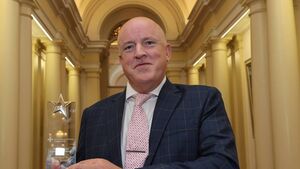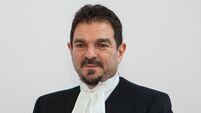'I know what it's like to be in the shadows' — Aubrey McCarthy, Tiglin founder, tells his story

Aubrey McCarthy when received the prestigious Irish Red Cross Humanitarian of the Year award earlier this year
Aubrey McCarthy, entrepreneur and Founder and Chairperson of Tiglin rehabilitation and housing services incorporates an intuitive, respectful and holistic approach to his work.
Coming from a tough childhood where he experienced addiction in his family and the struggles that come with it, Aubrey made it his personal mission to provide support for those struggling with addiction and homelessness.
He said: “I was brought up in in Punchestown on the family farm and my father was an auctioneer, but unfortunately there was addiction in the family and there was a bit of chaos.
"I remember growing up and seeing addiction for what it was”.
“I went into the Eastern Health Board in Naas, down Basin St. I just said, listen, I need help, there's members of my family in trouble. They basically said to me, sorry, there's nothing they can do for me because I'm a child”.
Aubrey then set out to provide the care and support he was denied by dedicating his life to helping people through the darkest times of their lives.
It all started after Audrey had started to come up in the business world after founding AMC Removals, an award-winning removals and storage company, to make some money to put himself through college. From there, he decided to buy a bus in 2006 to convert into a café called 'The No Bucks Café' for the homeless people of Dublin city:
“I met people that were amazing people, but just had become homeless through addiction and mental health, and it sort of made me think that after four weeks of rehab, they still come back to the hostel. They've nowhere to go and then a couple of weeks later, they're in trouble again because there's no supports”.
To address this, he founded Tiglin in 2008, designed to help people overcome addiction and improve their lives through an intensive rehabilitation aftercare programme that involves the housing, education and mentorship. Firstly, the men’s centre in Ashford, Wicklow was set up, and after that came the women’s shelter in Brittas Bay, Wicklow. Since then, Tiglin has seen the building of Coolnagreina community hub and housing for women and Carraig Eden for men in Greystones, Wicklow, as well as an emergency accommodation campus Jigginstown Manor in Naas. Further, a café and a bakery by the name of All Rise were built and are run by people from the programme, which has helped service users integrate back into society and become apart of their communities.
“The lads took to it like a duck to water. They loved it. They became baristas, they became part of the community, they became managers. If you go into most coffee shops in Greystones now they would have some of my past lads working in them because they proved themselves in the All Rise Café.”
“We opened the bakery. The girls who lived with us, they'd love jobs, but they couldn't get work because they had kids. So we opened the creche. The girls that had their their kids in the creche would produce bakery items and we'd sell them, pay them well above the minimum wage and it was like a circular economy”.
Education has always been very important to Aubrey, so he was going to make sure that every person that entered the Tiglin programme left with something that could benefit them in life going forward. He met Allen and Jay Bobinac, twin brothers and students that were sleeping rough in Phoenix park and studying during the evening in McDonald’s. When they met, Allen told Aubrey that he had failed one of his course modules, meaning he would have to repeat the entire year.
That’s when Aubrey decided to intervene: “I said, Alan, do you mind if I ring your lecturer and see would she allow you to repeat just the module rather than have to repeat the full year? I rang the girl, and she basically said ‘no’. I explained that he's living in adverse circumstances, so if we could give many opportunity and support. She said, ‘well, if he can't stand the heat, he shouldn't be in the kitchen’”. Not accepting this, Aubrey went further and got in contact with Director of Further Education and Training ETBI, Dr Joe Collins to reach out for help:
“He got them into a degree, which they did. They got an academic award for excellence from Simon Harris. And now both of those have now gone on to do not only a master's degree, but now have just completed their second master's degree each. So I just really showed me over the years that if a person is given the opportunity and they've never had that opportunity before, they're going to they're going to take it with both hands”.
Alan and Jay’s success in education changed the trajectory of Tiglin, highlighting education as an important facet of the whole recovery experience.
“So that allowed me form a partnership with SE Technological University. Simon Harris, when he was minister [of Education], gave me a grant of €830,000 to be used specifically for education for homeless and for people in the addiction cohort. So we've had 92 people in third level college doing up to master’s degree in the last calendar year. So that is phenomenal. And that all came from because I wanted to give people a CV”.
“Our job is to make sure they [service users] look at the stars. And when you meet people, rather than saying, ‘what are your issues?, we say, ‘where do you want to be in two years’ time? Would you like to be a singer? Would you like to be an architect? Let's put a plan in place that all of those things are achievable’”.
Aubrey describes his approach to addiction recovery as a “continuum of care”, which combines physical, mental, social and spiritual care:
“There's a gap that's hugely problematic. How does the person stay sober? So let's say they go from detox to rehabilitation, but then after rehabilitation, there's no aftercare available. So really it's joining those dots, it's having that continuum of care. That's what makes the difference”.
Aubrey has been politically active, pushing for change to empower those requiring services like Tiglin. He is running for Seanad Éireann to lift those up who can not speak for themselves and fight for access to housing and education in a way that also strengthens our economy, allowing for a more inclusive Ireland.





